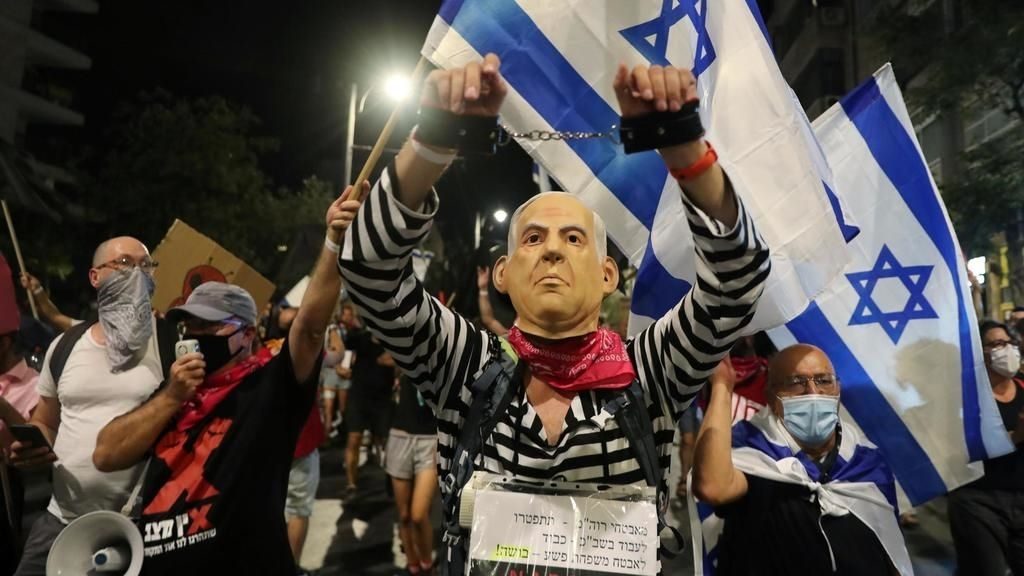For the tenth week in a row, tens of thousands of Israelis demonstrated last Saturday on Balfour Street in Jerusalem, in front of the Prime Minister’s residence. They were more than 40000 according to the organizers (who made sure to distribute bracelets to demonstrators in order to count them). Far from weakening, the protest movement extends to other sectors of the Israeli society.
This week ultra-Orthodox members of the Bretslav Hassidim sect joined the demonstrators for the first time in order to call for Netanyahu’s resignation. They blame him for using Ukrainian authorities in order to prevent them, due to the pandemic, from going on pilgrimage on Rabbi Nahman’s tomb in Uman on Rosh Hashana’s eve, as they do every year. Oh course, the fight against the spread of the Covid-19 should normally have justified the prohibition of that pilgrimage. But Netanyahu did not dare to face his Orthodox partners in the coalition, and preferred relying on the Ukrainians’s decision. That anecdote shows how demonstrations focus on the personality of Netanyahu whom demonstrators consider at best as a liar, and at worst, as a corrupt politician.
That mobilization extended also to Israeli expatriates: last Saturday, a few hundreds gathered in 18 cities in the world, from Berlin to San Francisco and from Paris to Vancouver, in support of the demonstrators of Balfour Street.
However, Netanyahu had hoped that the “Peace Agreement” he is about to sign in the coming weeks with the United Arab Emirates in Washington would allow him to regain public support beyond his electoral basis. But after having made the media headlines, that agreement, which does only endorse a normalization of relations existing de facto since the Oslo agreements between Israel and the Emirates, got an indifferent support of the majority of the Israeli Population. Aside from hundreds of Israeli High Tech compagnies most of which already do business in the Emirates, and upper-class people waiting for the airlines to open to go sightseeing in the Emirati major hotels—for half the price of Eilat hotels—, Israelis are mostly preoccupid by the economic crisis. Of course, Netanyahu argues that he obtained that agreement without making concessions to Palestinians and that it marks the victory of his policy of “Peace for Peace” instead of “Peace for Territories”, as usually advocated by the left. Bur in spite of all the American efforts, that agreement won’t be followed for the time being by other agreements with other Arab countries if negotiations with Palestinians do not progress. Meanwhile, the United Arab Emirates argue that in the framework of that agreement, they obtained from Israelis the abandonment of the project of annexation of part of the West Bank. The fact that the United States accepted to sell them at the same time F-35s combat aircrafts, with according to the Americans, the Israeli tacit agreement in spite of Netanyahu’s denial, was disclosed only afterwards (following the uproar caused in Israel by the prospect of such high-performing aircrafts being sold to an Arab country, the American administration committed itself to maintain the military advantage of Israel on its neighbours).
Faced with the lack of engagement of the Israeli population on the project of annexation included in the Trump plan, and considering the strong opposition to that project expressed by many countries and within the Jewish diaspora (a movement JCall was part of with the J-Link network), the Israeli leaders, like their American counterparts, were trying to achieve a breakthrough marking the success of the Trump plan without going back on their word. That is precisely what this “Peace Agreement” is offering them , and we welcome it together with J-Link—see J-Link press release on that topic.
At last, a few hours before the deadline of August 24th marking the end of the 100 days period allocated to every new government in order to present its budget, Netanyahu has accepted the proposition to extend that period of 120 days in order to avoid an immediate dissolution of the Knesset and a new election. However, the real reason of the standoff between Gantz and Netanyahu was not the question of the budget but Netanyahu’s requirement to have a veto power over the appointment of the Police Commissionner, the State Prosecutor and the Attorney General. Gantz refused and was successful so far.
However, most commentators agree to say that the elections are only postponed. Netanyahu understood that the timing was bad to go back to the polls, in the middle of an economic crisis and of a second wave of the pandemic, and while the majority of the public thinks that he wants to organize a new election to escape going to court and to obtain a majority liable to provide him with criminal immunity. We may thus expect other crises in the next weeks.
Meanwhile, we must welcome the failure of the project of annexation that, unlike what Netanyahu pretends, has not been only postponed but neutralized—at least temporarily, since its future will depend mostly on the results of the oncoming American elections. We should not forget that during the bracketing of that project, construction continues in the settlements, the process of retroactively legalizing houses built on Palestinian private land continues, and acts of violence of settlers against Palestinians go often unpunished. The issue of Occupation remains unresolved, and no agreement with the Emirates, Bahrein or else, as positive as it may be, could supplant it.
As for us, we will keep mobilized, in unison with a large part of the Israeli population and of Jewish diaspora involved in their fight for democracy in Israel and for peace. In the context of the sanitary crisis, we will probably have to organize our next meetings by using technological means of communication. We will be sure to keep you updated.






